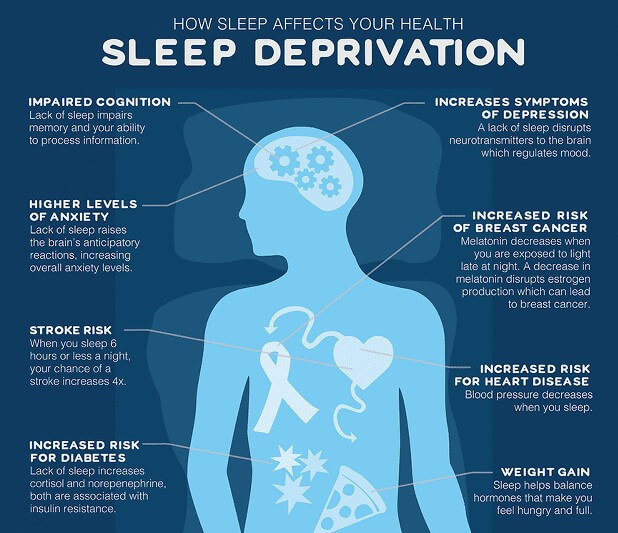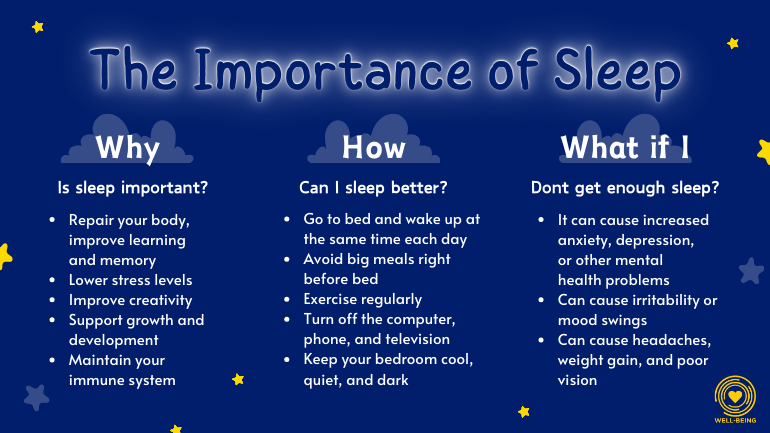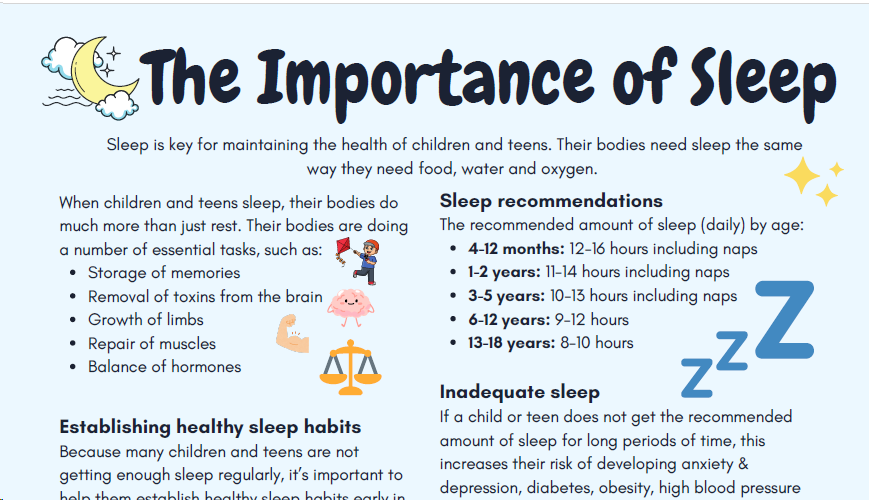Imagine waking up each morning feeling refreshed, energized, and ready to conquer the day. Sounds ideal, right?
The secret to achieving this isn’t some magic potion or a high-tech gadget; it’s something as natural as breathing – sleep. You might not realize it, but the quality of your sleep holds the key to your overall well-being. From boosting your mood to sharpening your memory, sleep is the silent powerhouse that impacts nearly every aspect of your life.
But what happens when you skimp on this vital function? Your productivity, health, and even happiness could take a hit. Have you ever wondered why you feel irritable after a sleepless night, or why you can’t seem to focus during the day? The answers lie in understanding the importance of sleep. By unlocking the mysteries of why sleep is so crucial, you can start making informed choices that will enhance your daily life. Get ready to uncover the profound impact that a good night’s sleep can have on your mental and physical health, and learn how you can harness its power to transform your life. Are you ready to dive into the world of sleep and discover how it can become your greatest ally?

Credit: www.atriummednyc.com
Benefits Of Quality Sleep
Quality sleep boosts health and mood, enhancing daily performance. It sharpens focus and supports physical recovery, fostering well-being.
Sleep is an often-overlooked pillar of health, yet its benefits are profound and far-reaching. Quality sleep is essential for your body to recharge and repair itself. When you prioritize your sleep, you’re not just resting; you’re investing in your overall well-being. Let’s dive into some of the incredible benefits that quality sleep can offer.Physical Health Boost
Quality sleep is a natural healer for your body. It strengthens your immune system, helping you fend off illnesses. Imagine waking up without the nagging cough that plagued you the day before. Your heart benefits too. Consistent sleep patterns can reduce the risk of heart disease and regulate blood pressure. This means waking up each day with a healthier heart. Furthermore, sleep aids in muscle recovery and growth. If you’re someone who enjoys working out, you know the importance of rest days. Sleep is your ultimate rest day, helping your muscles repair and grow stronger.Mental Well-being Enhancement
Good sleep sharpens your mind. You think clearer, make better decisions, and remember details more easily. Ever found yourself forgetting where you put your keys? Quality sleep might just help you remember. Sleep also enhances creativity. When your brain is well-rested, it’s more capable of thinking outside the box. You might find yourself solving problems more efficiently or coming up with innovative ideas at work. Moreover, sleep reduces stress levels. Imagine facing a challenging day with calm instead of chaos. Quality sleep equips your mind to handle stress better, keeping anxiety at bay.Emotional Stability
Emotions can run wild without proper sleep. Quality sleep helps regulate your mood, making you less prone to irritability. Have you ever snapped at someone and later regretted it? Proper sleep can help prevent those moments. Sleep also increases your emotional resilience. You can better handle disappointments and bounce back more quickly. This means facing life’s ups and downs with greater stability. Finally, sleep enhances your relationships. When you are well-rested, you communicate more effectively and empathize better with others. Consider how your interactions improve when you’re not battling fatigue. Quality sleep is not just a luxury; it’s a necessity. By recognizing its importance, you can transform your life in ways that are both practical and profound. So, tonight, consider going to bed a little earlier. Your body, mind, and emotions will thank you.Sleep And The Immune System
Sleep is more than just a nightly pause from the hustle and bustle of life; it’s a critical component of maintaining a healthy immune system. You’ve probably noticed how quickly a cold can take hold after a few restless nights. That’s not a coincidence. Sleep acts as the body’s natural defense mechanism, helping you ward off illness and stay vibrant.
Strengthening Immunity
When you sleep well, your immune system thrives. During deep sleep, your body produces cytokines, proteins that help fight inflammation and infection. Think of cytokines as your body’s alarm system, rallying the troops when bacteria or viruses invade. Isn’t it fascinating how your body uses sleep to prep for battle?
A good night’s sleep isn’t just about feeling rested; it’s about giving your body the time it needs to bolster defenses. Imagine waking up, knowing your immune system is primed and ready. It’s a powerful feeling, one that makes you less vulnerable to common colds and flu. Ever wondered why you feel better after a nap when you’re sick? Your body uses that downtime to strengthen your immunity.
Sleep Deprivation Effects
Skipping sleep has its consequences. Your immune system weakens, leaving you susceptible to infections. Lack of sleep leads to a drop in cytokines, reducing your ability to fight off sickness. Have you ever noticed a runny nose after pulling an all-nighter? That’s your body’s way of signaling that it’s struggling.
Chronic sleep deprivation can even affect how your body responds to vaccines. If you’re not well-rested, vaccines might not be as effective. Your body needs sleep to process and react to them efficiently. It’s a crucial insight, especially as flu season approaches. Are you giving your immune system the support it needs?
Consider how powerful sleep can be. By prioritizing rest, you’re not just boosting your mood; you’re also fortifying your health. Next time you’re tempted to stay up late, ask yourself: is it worth compromising your immune system? Sleep isn’t just a luxury; it’s a necessity for keeping illness at bay and maintaining your body’s natural defenses.
Cognitive Function And Sleep
Sleep is vital for optimal cognitive function. It affects how we think, learn, and remember. During sleep, the brain processes information and forms memories. Lack of sleep can impair these processes. This makes it harder to focus and solve problems. Let’s explore how sleep impacts memory and problem-solving abilities.
Memory Consolidation
Memory consolidation occurs during sleep. The brain strengthens and organizes memories. This helps us recall information better. Sleep cycles, especially REM sleep, play a key role. They help transfer short-term memories to long-term storage. Without enough sleep, this process is less effective. This can lead to forgetfulness and learning difficulties.
Problem Solving Abilities
Problem-solving requires creativity and clear thinking. Sleep enhances these abilities. During sleep, the brain processes complex information. This helps in finding solutions to difficult problems. Lack of sleep can cloud judgment. It may lead to poor decision-making and hinder creativity. Ensuring adequate sleep can boost problem-solving skills significantly.

Credit: whps.sswb.ucf.edu
Sleep And Stress Management
Quality sleep plays a vital role in reducing stress levels. It helps the body and mind recover. Lack of sleep can increase stress, affecting mood and health. Prioritizing restful sleep boosts overall well-being.
Sleep plays a vital role in managing stress, acting as a natural healer for your mind and body. When you sleep, your body enters a restorative phase that helps in balancing hormones and reducing stress-related symptoms. Without sufficient sleep, you might find yourself overwhelmed, anxious, and less capable of handling daily challenges.Reducing Stress Levels
A good night’s sleep can dramatically lower stress levels. Your body produces less cortisol, the stress hormone, during sleep, which helps you feel more relaxed and calm. Ever noticed how a sleepless night leaves you feeling frazzled and on edge? That’s because lack of sleep keeps cortisol levels high, making stress harder to manage. Consider setting a regular bedtime to help your body establish a natural rhythm. What would it feel like to wake up refreshed and ready to tackle the day?Improving Resilience
Sleep doesn’t just help with stress; it builds resilience too. When you’re well-rested, you’re better equipped to handle life’s ups and downs. Imagine a challenging day at work. If you’ve slept well, you’re likely to approach problems with a clearer mind and more patience. Sleep strengthens your emotional resilience, making you less reactive to stressors. Try prioritizing sleep as a key part of your stress management strategy. Isn’t it time you gave yourself the best chance to thrive in the face of stress? Investing in quality sleep is more than just a luxury; it’s a necessity for a balanced and stress-free life. Consider how much more productive and happy you could be by simply allowing your body the rest it needs.Sleep Disorders And Their Impact
Quality sleep is crucial for our well-being. Many people face challenges due to sleep disorders. These disorders disrupt sleep patterns. They lead to fatigue and poor health. Understanding their impact is essential. It helps in managing health effectively.
Common Sleep Disorders
Sleep disorders vary widely among people. Insomniais the most common. It makes falling asleep difficult. Sleep apneais another major issue. It involves breathing interruptions. Restless Legs Syndrome (RLS)causes leg discomfort. It often occurs at night. Each disorder affects sleep differently. They all lead to disturbed rest.
Long-term Health Effects
Sleep disorders impact health over time. Poor sleep weakens the immune system. It increases the risk of illnesses. Heart disease and diabetes are more likely. Mental health also suffers. Anxiety and depression can worsen. Cognitive functions decline with lack of rest. Concentration and memory get affected.
Addressing sleep disorders is vital. Early intervention can improve quality of life. It helps maintain overall health. Recognizing symptoms is the first step. Seeking help leads to better sleep patterns. Ultimately, it supports a healthier lifestyle.

Credit: acdkids.org
Tips For Better Sleep
Sleep is vital for good health and daily function. Quality sleep improves mood, boosts memory, and supports the immune system. Prioritizing restful nights can lead to better overall well-being.
Getting a good night’s sleep is crucial for your health and wellbeing. Yet, many of us find it challenging to drift off easily and wake up refreshed. Let’s explore some practical tips to enhance your sleep quality, ensuring you wake up feeling rejuvenated and ready to face the day.Creating A Sleep-friendly Environment
The environment you sleep in has a significant impact on your sleep quality. Start by ensuring your bedroom is a sanctuary for relaxation. Keep it cool, dark, and quiet. Consider investing in blackout curtains if streetlights disrupt your sleep. A white noise machine can mask unpleasant sounds, providing a soothing backdrop to lull you to sleep. Think about your mattress and pillows. Are they comfortable? If you wake up with a sore back or neck, it might be time to replace them. Your bed should support your body comfortably, encouraging restful sleep.Healthy Sleep Habits
Developing healthy sleep habits can significantly improve your sleep quality. Try to stick to a regular sleep schedule. Going to bed and waking up at the same time every day helps regulate your body’s clock. Limit screen time before bed. The blue light from phones and computers can interfere with your body’s natural sleep-wake cycle. Instead, consider reading a book or listening to calming music. Pay attention to what you eat and drink before bed. A heavy meal or caffeine can keep you awake. Opt for a light snack and herbal tea to wind down your day. Have you ever noticed how a calming bedtime routine can ease you into sleep? A warm bath or meditation can signal your body that it’s time to relax. Are your sleep habits helping or hindering your sleep quality? Reflect on your routine and make adjustments as needed.Frequently Asked Questions
Why Is Sleep Essential For Health?
Sleep is vital for maintaining physical and mental health. It helps repair tissues, boost immune function, and enhances cognitive performance. Adequate sleep supports emotional regulation, stress management, and overall well-being, making it crucial for a balanced lifestyle.
How Does Sleep Affect Brain Function?
Sleep plays a key role in brain health. It consolidates memories, enhances learning, and improves concentration. During sleep, the brain processes information, clears toxins, and rejuvenates itself. Quality sleep supports optimal brain function and cognitive abilities.
Can Lack Of Sleep Lead To Health Issues?
Yes, insufficient sleep can cause various health problems. It increases the risk of heart disease, diabetes, and obesity. Lack of sleep affects mood, concentration, and memory. Chronic sleep deprivation can lead to mental health disorders and weaken the immune system.
How Much Sleep Is Recommended For Adults?
Adults typically need 7-9 hours of sleep per night. The exact amount varies by individual, lifestyle, and health conditions. Quality sleep is important for restoring energy, enhancing mood, and supporting overall health and wellness.
Conclusion
Sleep is vital for health and well-being. It helps the body recharge. Proper rest boosts mood and focus. Sleep strengthens the immune system. Without enough sleep, health issues arise. Fatigue affects daily performance and safety. Prioritize a good sleep routine.
Create a calm bedtime environment. Limit screen time before bed. Consistent sleep schedules improve quality of life. A good night’s sleep benefits mind and body. Embrace habits that promote restful sleep. Your body and mind will thank you. Sleep well, live well.

